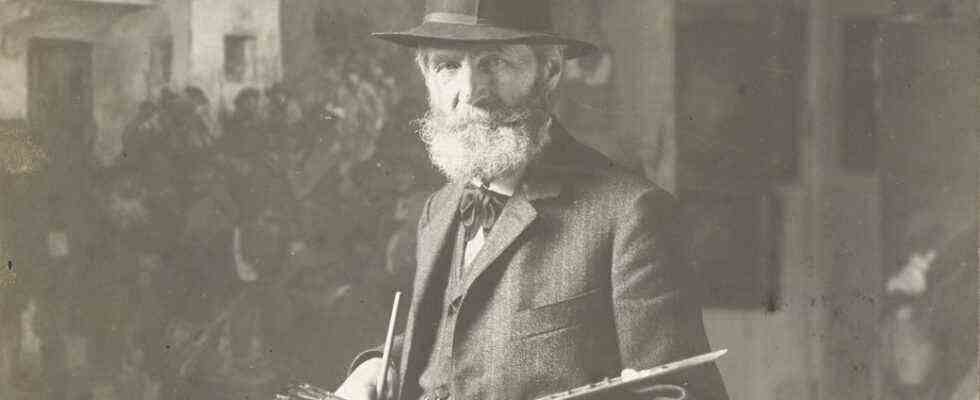Franz von Defregger was one of Hitler’s favorite painters. For that reason alone he was finished for the art world after 1945, even if the artist, who died in 1921, could not do anything for his National Socialist fan. Last year, the Innsbruck Ferdinandeum successfully corrected the image of the mere peasant painter with a retrospective on the 100th anniversary of his death. The art historian Angelika Irgens-Defregger, married to the painter’s great-grandson, worked as a curator of the exhibition and also dealt extensively with the biography of the artist in the catalogue, who in his historical paintings skillfully and extremely successfully combined history and genre. Now she has published a new, richly illustrated book about Defregger, which focuses on the memoirs of the “painter prince”.
The 36 single sheets in historical quarto format, written on both sides by hand, were long considered lost. It was known that they existed or had existed because the Defregger biographer Heinrich Hammer mentioned them in his monograph in 1940. They were rediscovered in family ownership shortly before Irgens-Defregger’s book was to be printed. Your dating is difficult. The only thing that is certain is that they were not completed before the summer of 1915, Irgens-Deffregger concludes from a sentence by the painter about the Hochkaser Alm near Bozen, a family home where, according to Defregger, they spent their summer holidays “until the Italians declared war” in 1915 . It is no longer possible to determine who transcribed the handwritten manuscript. However, copies of the typescript have been in archives in Nuremberg and Innsbruck since the 1970s and 1980s.
Brilliant businessman
In addition to the extensively commented retrospective of the painter, the author also deals in an essay with the view of the contemporaries on the brilliant businessman, who seemed to some to be overly profit-oriented even during his lifetime. The memories, of course, begin in the childhood of the painter, who was born in 1835, and describe his early years on a mountain farm in East Tyrol.
Unlike many of his paintings, Defregger’s descriptions of rural life do not appear idyllic. He soberly reports of a childhood in poverty, of strokes of fate and the typhus epidemic of 1841, which not only killed his mother but also four of his siblings. life was hard Although Defregger’s grandfather had ensured that each of his sons had his own farm, the estates were all heavily indebted. “You can imagine how people struggled to pay their debts,” writes Defregger. It was a matter of course that his father Michael, allegedly the “most capable” of the sons, would help a brother or his widow. The respective properties were simply exchanged for a few months, and the family moved with them. Defregger raves about the tasty squirrels that he “got well roasted to eat.” On Wednesdays and Saturdays there were “Schlüpfkrapfen”, the dough of which the child preferred to use to model figures. His talent was recognized early on in the family, especially since the boy soon understood how to sign guilder notes in a deceptively real way, which is why his father even had to answer in court.
An incomplete version of the painting “Sunday Peace” by Franz von Defregger.
(Photo: Private)
However, his desire to draw waned when he was increasingly forced to do heavy work from the age of fourteen. The father died in 1858 and the almost 23-year-old had to take over the farm. “My happy days were over, only the worries that come with such a farm came,” writes Defregger. He didn’t last long and sold the farm to a cousin two years later. He actually wanted to emigrate to America, but he contented himself with Innsbruck and prepared himself there with the sculptor Michael Stolz for admission to the Royal Academy in Munich. He was accepted, but since Hermann Anschütz’s painting class there was not enough for him, he moved on to Paris in 1863. He’s fascinated, too, by the restaurants that have small baked fish “which were very good to eat, but appalling to see scooped out of a barrel with a wide ladle and poured into a pan of boiling fat. The poor little animals jumped up high!” Two years later he returns to Munich and finds that the people here are much more serious than in Paris.
Defregger does not write about the pace of his career and the unprecedented successes. In general, he is economical with feelings and likes to flee into the anecdotal. The description of a mountain tour on the Großvenediger, during which countless crevasses have to be overcome, culminates in the succinct statement: “The view was magnificent, but you can’t see anything of Venice.”
Angelika Irgens-Defregger (editor): Franz von Defregger. Memoirs of a “painter prince”. Allitera Publishers, 180 pages, price: 20 euros.

